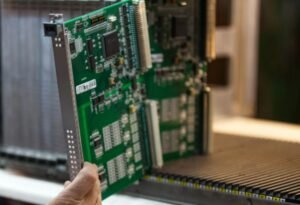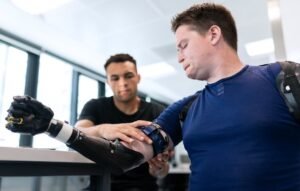Is AI Software or Hardware?
Artificial Intelligence (AI) has become an integral part of our daily lives, permeating various industries and revolutionizing the way we live, work, and interact. As AI continues to advance, a common question arises – is AI primarily a software or a hardware technology?
Key Takeaways:
- AI combines both software and hardware components.
- Software plays a crucial role in AI, enabling algorithms and learning capabilities.
- Hardware provides the computational power and infrastructure for AI applications.
While AI is a combination of software and hardware, it is essential to understand the roles and contributions of each component.
**Software** forms the foundation of AI as it encompasses the algorithms and programming that enable intelligent behavior. Through sophisticated machine learning algorithms and neural networks, AI software can process vast amounts of data, recognize patterns, and make decisions or predictions. *For example, AI software can analyze medical images to assist doctors in diagnosing diseases more accurately and efficiently.*
**Hardware** serves as the backbone of AI, providing the necessary computational power and infrastructure to support AI applications. Hardware components, such as powerful processors and graphics processing units (GPUs), enable faster data processing and facilitate the training and inference processes of AI models. *State-of-the-art AI systems rely on high-performance GPUs to speed up calculations and handle complex deep learning algorithms effectively.*
AI’s software and hardware components work hand in hand to achieve optimal performance and functionality. The following factors highlight the importance of both software and hardware in AI:
- **Speed**: High-performance hardware accelerates AI processes, enabling real-time decision-making and analysis.
- **Scalability**: AI systems require scalable hardware infrastructure to handle increasing data volumes and growing computational demands.
- **Efficiency**: Well-optimized software algorithms can maximize hardware utilization, enhancing energy efficiency and reducing costs.
**Table 1:** Comparing AI Software and Hardware Components
| AI Software | AI Hardware |
|---|---|
| Includes algorithms and programming | Provides computational power and infrastructure |
| Facilitates learning and decision-making processes | Enables real-time analysis and efficient processing |
| Optimizes and maximizes software utilization | Handles increasing data volumes and computational demands |
Additionally, advancements in AI technology have led to the development of specialized hardware, known as **AI chips** or **AI accelerators**. These dedicated hardware components are designed specifically for AI workloads, offering enhanced performance and efficiency. *For instance, AI chips like Graphics Processing Units (GPUs) and Tensor Processing Units (TPUs) can accelerate AI training and inference, significantly reducing processing times.*
The benefits of AI software and hardware aren’t limited to a single industry, but rather, they have wide-ranging implications:
- **Healthcare**: AI-powered software combined with high-performance hardware can aid in diagnosing diseases, analyzing medical images, and predicting patient outcomes.
- **Transportation**: AI algorithms and computational hardware enable autonomous vehicles to understand surroundings, detect obstacles, and make real-time decisions while on the road.
- **Finance**: AI software algorithms can detect fraudulent activities, optimize investment strategies, and automate financial processes, while robust hardware provides the power to process vast amounts of financial data swiftly.
**Table 2:** AI Application Examples
| Industry | AI Application |
|---|---|
| Healthcare | Diagnosing diseases and analyzing medical images. |
| Transportation | Enabling autonomous vehicles to make real-time decisions. |
| Finance | Detecting fraudulent activities and optimizing investment strategies. |
AI is a powerful technology that relies on the synergy between software and hardware components,* driving innovation across various sectors. As AI continues to evolve, advancements in both software algorithms and specialized hardware will be critical in unlocking its full potential.
Overall, AI is a blend of software and hardware, each playing a crucial role in delivering efficient, powerful, and transformative AI systems that augment human capabilities and enhance productivity across industries.
**Table 3:** The Synergy Between AI Software and Hardware
| AI Software | AI Hardware |
|---|---|
| Enables intelligent behavior with algorithms and programming. | Provides computational power and infrastructure for AI applications. |
| Processes vast amounts of data and recognizes patterns. | Accelerates AI processes and supports real-time analysis. |
| Optimizes performance and maximizes hardware utilization. | Handles growing data volumes and computational demands. |

Common Misconceptions
AI is Software, Not Hardware
One common misconception people have about AI is that it is a hardware component. However, AI refers to the intelligence displayed by software algorithms and not the physical devices themselves.
- AI is a complex software application that can be run on different hardware platforms.
- The hardware, such as computers or servers, is used to execute the AI software.
- The AI software is responsible for processing and analyzing data to make intelligent decisions or perform tasks.
Hardware is Essential for AI
While AI is software-driven, hardware is still an essential component in developing and running AI applications. Without the right hardware, AI algorithms may struggle to perform efficiently or deliver accurate results.
- A specific type of hardware, called accelerators or GPUs, is often used to improve the performance of AI models.
- Specialized hardware can enhance the speed and efficiency of training and inference processes in AI applications.
- The hardware architecture needs to be carefully designed and optimized to handle the computational demands of AI algorithms.
A Single Hardware Component Can Achieve AI
It is another misconception to believe that AI can be achieved with a single hardware component. AI systems require a combination of software, hardware, and data to function effectively. Simply buying a powerful computer does not automatically make it an AI system.
- AI development involves complex algorithms, extensive training data, and powerful hardware working together.
- The software and hardware components need to be integrated and optimized to achieve efficient and accurate AI performance.
- An AI system is the product of the combined efforts of software engineers, data scientists, and hardware specialists.
AI Software Can Run on Any Hardware
Contrary to popular belief, AI software cannot run equally well on any hardware. While AI algorithms are designed to be hardware-agnostic, there are still limitations and requirements for optimal performance.
- The compatibility and performance of AI software depend on the hardware’s computational capabilities, memory capacity, and parallel processing capabilities.
- Certain types of AI models may require specific hardware configurations or accelerators to meet their computational demands.
- Developers often need to fine-tune the AI software to take advantage of hardware-specific optimizations.
Hardware Skills Are Not Necessary for AI Development
Some people believe that AI development is solely a software-focused field and that hardware skills are not necessary. This is a misconception as understanding the hardware architecture and its limitations can greatly impact the performance and efficiency of AI applications.
- Developers need to have an understanding of the hardware specifications and capabilities to design and optimize AI algorithms.
- Knowledge of hardware can help in selecting the right components and configurations to meet the computational requirements of AI models.
- Collaboration between hardware and software teams is crucial for efficient AI system development.

AI Software vs. Hardware: A Comparative Analysis
Artificial Intelligence (AI) has been at the forefront of technological advancements in recent years. However, there is often confusion about whether AI should be attributed to its software or hardware components. In this article, we present a comparative study between AI software and hardware, shedding light on their respective contributions and capabilities.
Software Capabilities Comparison
AI software plays a crucial role in enabling machine learning algorithms to analyze, interpret, and make decisions based on data. The following table highlights some key capabilities of AI software:
| Capability | Description |
|---|---|
| Natural Language Processing | Enables AI systems to understand and interpret human language, facilitating communication. |
| Image Recognition | AI software can accurately identify and classify objects, patterns, or symbols within images. |
| Speech Recognition | Allows AI systems to transcribe and understand spoken language, enhancing voice-controlled interfaces. |
| Predictive Analytics | AI software employs statistical techniques to forecast trends, patterns, and future outcomes. |
Hardware Capabilities Comparison
While AI software provides the analytical capabilities, AI hardware is responsible for optimizing computational power and facilitating efficient processing. The table below presents various capabilities of AI hardware:
| Capability | Description |
|---|---|
| Parallel Processing | AI hardware utilizes parallel computing to quickly process large volumes of data simultaneously. |
| Graphical Processing Units (GPUs) | GPUs are specialized processors that accelerate AI computations and enhance deep learning performance. |
| Neuromorphic Chipsets | These chips mimic the structure and functionality of the human brain to facilitate AI learning processes. |
| Quantum Computing | AI hardware leverages quantum mechanics to perform complex calculations and solve intricate problems. |
Application Comparison
Both AI software and hardware find extensive application across various domains. The table below illustrates some examples of their applications:
| Application | AI Software | AI Hardware |
|---|---|---|
| Virtual Personal Assistants | Utilizes software algorithms for natural language processing and voice recognition. | Deploys hardware accelerators for rapid voice and speech processing. |
| Autonomous Vehicles | AI software enables self-driving cars to interpret surroundings and make real-time decisions. | AI hardware enhances processing speed for real-time analysis of sensor data. |
| Medical Diagnosis | Software algorithms assist in analyzing medical records and providing diagnostic recommendations. | AI hardware accelerates the processing of large medical datasets for quicker diagnosis. |
| Financial Trading | AI software utilizes predictive analytics to determine market trends and automate trading decisions. | High-performance AI hardware helps to analyze and process vast amounts of financial data in real-time. |
Performance Comparison
When evaluating the performance of AI systems, both software and hardware aspects must be considered. The table below compares their performance criteria:
| Performance Criteria | AI Software | AI Hardware |
|---|---|---|
| Processing Speed | Software optimization techniques can enhance processing speed. | Specialized hardware accelerators can significantly improve processing speed. |
| Power Consumption | Software optimizations aim to reduce power consumption. | AI hardware requires efficient power management techniques to minimize consumption. |
| Scalability | Software scalability depends on efficient algorithms and distributed computing techniques. | Hardware scalability requires the addition of more components to expand computing capacity. |
| Accuracy | Software accuracy depends on the quality and diversity of the training data. | Hardware accuracy is influenced by the precision and complexity of the computational models. |
Investment Comparison
Investing in AI technology involves considerations regarding implementation costs and potential returns. The following table compares some aspects of investing in AI software and hardware:
| Aspect | AI Software | AI Hardware |
|---|---|---|
| Cost | Requires investment in software development, licensing, and maintenance. | Involves costs associated with purchasing and maintaining specialized AI hardware. |
| Flexibility | Software can be updated and adapted easily to changing requirements. | Hardware may require substantial modifications or replacements for upgrades. |
| Return on Investment | Software solutions can yield high returns due to their wide range of applications. | Hardware investments may yield lower returns, but advancements in AI increase their value. |
| Maintenance | Software maintenance involves ongoing updates, bug fixes, and security patches. | Hardware maintenance includes regular monitoring, troubleshooting, and component replacements. |
Regulatory Considerations
AI technology has raised concerns regarding ethical and regulatory frameworks. The table below highlights some important considerations in this domain:
| Consideration | AI Software | AI Hardware |
|---|---|---|
| Data Privacy | Software must adhere to strict data privacy regulations to protect user information. | Hardware should incorporate security measures to ensure data integrity and protection. |
| Ethical Decision-Making | Software algorithms should be designed to make ethical decisions and avoid bias. | The architecture and design of hardware should support ethical AI decision-making. |
| Transparency | Software should provide transparency in decision-making processes, enabling auditability. | Hardware should include mechanisms for transparent operation and rule-based decision traceability. |
| Compliance | Software must comply with relevant regulations, such as data protection and industry standards. | Hardware compliance entails adhering to safety standards and regulatory requirements. |
The Future of AI: A Synergistic Approach
The debate between AI software and hardware is not a question of exclusivity, but rather one of collaboration and synergy. Both components are necessary for the successful implementation and advancement of AI technology. As AI progresses, software and hardware will continue to evolve hand in hand, augmenting each other’s capabilities and paving the way for unprecedented breakthroughs. Embracing the synergistic potential of AI software and hardware will lead to transformative applications in science, engineering, healthcare, and much more.
Frequently Asked Questions
Is AI Software or Hardware?
What is AI?
AI stands for Artificial Intelligence. It refers to the simulation of human intelligence in machines that are programmed to think and learn like humans.
Is AI considered as software or hardware?
AI is primarily considered as software. It encompasses algorithms, models, and data that are used to create intelligent systems. However, AI applications often require hardware resources to run efficiently, such as powerful processors or specialized hardware like GPUs.
What are the software components of AI?
The software components of AI include machine learning frameworks (such as TensorFlow, PyTorch), programming languages (such as Python, R), natural language processing libraries, and neural network architectures.
Which hardware is commonly used in AI?
Common hardware used in AI includes high-performance processors (CPUs), graphical processing units (GPUs) that excel in parallel processing, and specialized AI hardware like TPUs (Tensor Processing Units) developed by Google.
Can AI run only on specialized hardware?
No, AI can run on general-purpose hardware like CPUs. However, specialized hardware, such as GPUs or TPUs, can significantly enhance the performance and speed of AI computations due to their parallel processing capabilities.
Are there any AI-specific hardware developments?
Yes, there have been specific hardware developments for AI. GPUs, originally designed for graphics rendering, have been extensively utilized in AI for their ability to accelerate deep learning algorithms. TPUs, on the other hand, are engineered specifically for AI workloads.
Is AI hardware-dependent?
AI is not fundamentally hardware-dependent. It is primarily reliant on software for its core functionality. However, the choice of hardware can impact the speed and efficiency of AI computations.
Can AI applications be run on cloud platforms?
Absolutely. Many cloud platforms provide AI services and infrastructure, allowing users to deploy and run AI applications without worrying about the underlying hardware resources.
Are there AI applications that require specialized hardware?
Yes, certain AI applications, particularly those involving large-scale data processing or complex deep learning models, can greatly benefit from specialized hardware like GPUs or TPUs. It enables faster training and inference times.
Do AI systems require both software and hardware expertise?
Yes, developing and deploying AI systems often requires expertise in both software and hardware domains. Software expertise is necessary for creating AI algorithms and models, while hardware expertise is important for optimizing the system’s performance.





